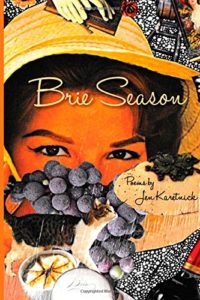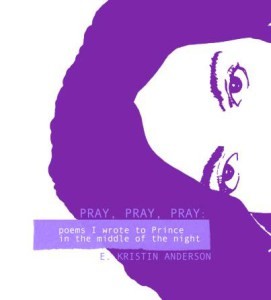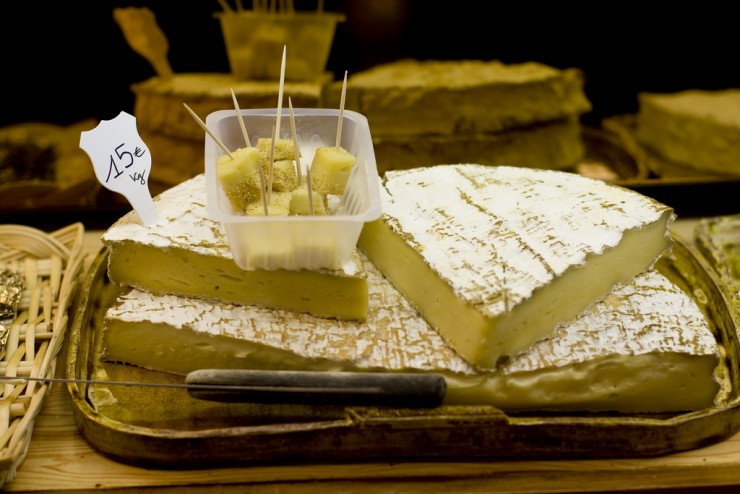We find all kinds of things to write poems about, like food, and cheese, and the rock star Prince. At least, we write about food and Prince when we are really writing about something deeper.
Jen Karetnick is a poet and author who has written (and co-authored) books about food, like a recipe book for mangoes, entitled to no surprise, Mango. Food is an important part of our lives, for more than the obvious reasons of sustenance and survival. Food is part of culture, for good and for ill.
In Brie Season: Poems, Karetnick has assembled some 60 poems which are ostensibly about food, but go deeper into the culture that frames what we call food and the human emotions that come into play. The poems are about tomatoes, mangoes, date palms, how to drink champagne alone, deviled eggs, bagels, hard-boiled eggs, oranges, cookies, mustard, asparagus, mushrooms, cocktails, cappuccino, and more. One poem is about cheese, or more precisely, it is a response to an observation G.K. Chesterton made about cheese (“Poets have been mysteriously silent on the subject of cheese”).
A Note to GK Chesterton

“mysteriously silent on the subject of cheese, ”
perhaps it’s because few are the poets
who would choose as a muse
a bloomy rind triple crème
coated with penicillium candidum
when great white herons miss the bay
and, with breeze-fuzzed feathers,
land instead to amuse toddlers by stalking
reef geckos not quite camouflaged
among the grasses growing like lies
on the sand-held bricks of driveways
where basketball nets hang – the tattered
tails of kites – or wax about calf rennet
when older boys wheel like hawks
on baseball diamonds and our daughters
run, more long-legged every day,
under phone wires lined with a dozen
observant ibis, or care about cheddaring
and cave aging when none of these
things are true, and the children we never
bore are regrets, difficult to census
yet kept warm in the nests
of plume-hunted, colonial egrets.
That poem provides the flavor of Brie Season—it begins speaking about a food and then becomes something else entirely.
Karetnick received an MFA in poetry from the University of California-Irvine and an MFA in fiction from the University of Miami. She is the author of three books of poetry, including the forthcoming American Sentencing, and four chapbooks: Prayer of Confession, Landscaping for Wildlife, Bud Break at Mango House, and Necessary Salt. She is a freelance writer, publishing in numerous food and general interest magazines, including two articles for The Atlantic: “Virtual Education: Genuine Benefits or Real-Time Demerits?” and “Behind the Scenes of Teenage Writing Competitions.” Additionally, she’s won numerous awards and honors for both her poetry and her writing on food.
And then there is the rock star Prince. I previously thought that the only celebrity who had merited a full collection of poetry was Kanye West, but I was wrong. A new chapbook by E. Kristin Anderson, Pray, Pray, Pray: Poems I Wrote to Prince in the Middle of the Night, includes some 11 longish poems about or addressed to the singer. (Full disclosure: the only song of Prince’s that I’m familiar with is Raspberry Beret, which for the longest time I thought was “Raspberry Toupe.”) (And note that the link is not to the original Prince version; it’s under copyright dispute and the audio track has been removed from the Prince recordings.)
Regardless of your familiarity with Prince, Anderson’s poems are accessible and, like Karentnick’s and food, about more than just the rock star.
Hiding is the only thing that matters this summer

like a song in the lungs. Tell me about
how twenty years ago I was eleven
and you were lost. Tell me—what ghosts
am I waiting for in the dark?
It rains on the stereo
and in the parking lot. Tell me why my feet
will feel the ground when I wake up,
that standing in the sun will hollow out the saints
and the chill on my arms is a secret.
Do you remember quiet, the anonymous white
of blanket forts and midnight phone calls?
This is the one that stops me, that lays me out.
And if I close my eyes you’ll tell me—tell me
when to lift the shades and look.
Anderson is a graduate of Connecticut College with a B.A. degree in Classics. She worked at The New Yorker, and is currently a freelance editor and writing coach in Austin, Texas. She’s the author of six poetry chapbooks, including A Guide for the Practical Abductee, A Jab of Deep Urgency, and three to be published in 2016. She is also the co-editor of Dear Teen Me: Authors Write Letters to Their Teen Selves and The Summer of Unraveling, a Young Adult “memoir in verse” to be published in 2017. She blogs at Write All the Words.
Both collections are good examples of how poets use subjects in popular culture to write about emotion, people, relationships and growing up.
Photo by Dennis Yang, Creative Commons, via Flickr. Post by Glynn Young, author of the novels Dancing Priest and A Light Shining, and Poetry at Work.
__________________________

“I require all our incoming poetry students—in the MFA I direct—to buy and read this book.”
—Jeanetta Calhoun Mish
- Poets and Poems: Beth Copeland and “I Ask the Mountain to Heal My Heart” - July 10, 2025
- A.E. Stallings: the Parthenon Marbles, Poets, and Artists - July 8, 2025
- Poets and Fables: Steven Flint and “The Sun and the Boy” - July 3, 2025



Donna says
Glynn, I really loved this…. that second poem was so moving to me. This line,
Tell me about this gift—the heart that burns
like a song in the lungs.
It reminded me of my son – how his music moves through him, and it isn’t always pleasant and it sometimes resembles burning.
Glynn says
Donna — it is a good one, isn’t it? The chapbook, with only 11 poems, contains several that have that sense to them.
Donna says
I have a cousin who LOVES Prince, and I directed her over to this – I think she’d like it!
Rick Maxson says
I’m so happy you highlighted these poets, Glynn. Both poems seem to show us where our senses can take us.
We ran “Hiding is the only thing that matters this summer” in October. It took me several readings to “get” the poems in “Pray, Pray, Pray.” One of the other poems I loved had these words of hiding:
“I laid in blue
sheets, waiting for the elevator. Waiting
to shake the dust from my hair. Trying
to remember how those notes on that guitar
made me shiver. I turned up the AC.”
Glynn says
I liked this collcction, Rick. She has several other chapboooks I’d like to take a look at.
Bethany says
I’ve always enjoyed the humor in that G.K. Chesterton’s quote. It was well worthwhile to look at a response to it through another set of eyes and circumstances. I felt the gravity and the ache in Karetnick’s poignant piece. Thank you for writing and sharing this post.
Glynn says
Bethany – thanks for the comment.
Mary Sayler says
Thank you, Glynn, for helping members of our Christian Poets & Writers group on Facebook get better acquainted with poets and poetry. I’ll highlight your post on the CP&W blog http://www.christianpoetsandwriters.com. God bless.
Glynn says
Mary – thank you!
Laurie Klein says
So engaging and appetizing, Glynn—your words and images as well as their.
Glynn says
Laurie – thanks for reading and the comment. And congratulations on the new poetry collection!